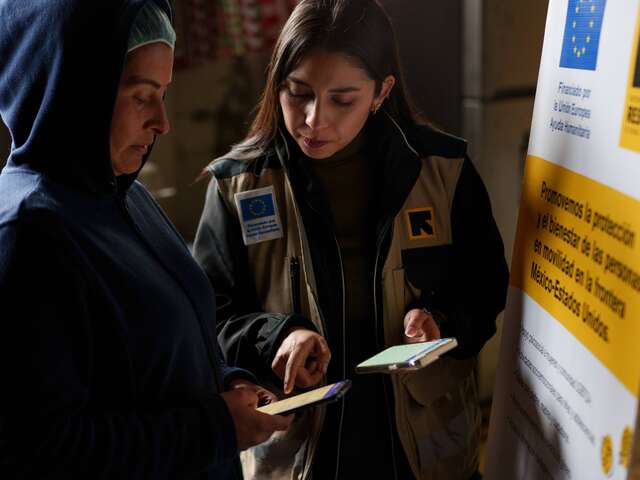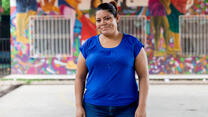Leaving one's hometown in search of asylum is often a harrowing journey, caused by dire circumstances such as crime, rampant violence, and instability. This departure marks the beginning of a turbulent journey, defined by uncertainty and resilience, as individuals navigate the complex web of immigration policies and seek refuge in unfamiliar lands.
For asylum seekers along the Mexican northern border, protection mechanisms are a priority need. An IRC assessment conducted in October 2023 indicates that at least half of people reported not feeling safe in Mexico, and 4 in 10 expressed they had experienced at least one crime. Another crucial requirement is access to reliable information, as highlighted in a 2023 survey conducted by the IRC in Mexico, where participants identified the three most pressing needs.
For many individuals, the decision to depart is not merely a matter of choice but a necessity for survival.
Sara*, as many of her fellow Mexicans, embarked on a journey full of hardships to ensure the safety of her family and secure a better future for her children.
Sara, 36, from southern Mexico, poses for a portrait in the courtyard of a shelter in Ciudad Juárez.
Photo: Paul Ratje for the IRC
A relentless protector
For Sara, the turning point that made her leave her hometown in Southern Mexico was crime and extortion. When a criminal group threatened Sara and her family, she had no means of protection whatsoever.
Sara asserts that organized crime groups deliberately extort families, collecting whatever they can regardless of the families’ financial circumstances.
"More than anything, I won’t let another repercussion against my family,” Sara said, explaining why she decided to travel to Ciudad Juarez. Nonetheless, Sara stressed that making the decision was difficult as she left her relatives, friends, and her whole life behind.
Sara holds her nine-year-old son, who has cerebral palsy, at a shelter in Ciudad Juárez.
Photo: Paul Ratje for the IRC
In addition, Sara is the caretaker and breadwinner for her three children. The youngest lives with cerebral palsy, a condition requiring specific medical care unavailable in Mexico. By seeing this journey through, Sara hopes she can provide decent healthcare for her youngest child, and that one day she can see him walk again.
“I [will] move heaven, sea, and earth for them,” said Sara, describing her children as the source of her strength at all times.
Navigate the uncertainty
Upon departing her hometown, Sara was confronted with uncertainty regarding the necessary steps to seeking asylum, the duration of her journey, and accommodations for herself and her children. Her sole directive was to head north to Ciudad Juarez, relying on information provided by a friend.
During their search for information on asylum registration locations, Sara glanced at her eldest son with concern and remarked, "If they don’t give us the information here, we are going to stay in the [open] air."
Adriana García, 28, is a Women’s Protection and Empowerment and Child Protection Manager for IRC. At the shelter, she shows Sara the InfoDigna website, which has safe and reliable information for migrants transiting through Mexico.
Photo: Paul Ratje for the IRC
Sara reflected on the value of reliable information, expressing a desire for access to resources. She noted that in such circumstances, individuals often grapple with a myriad of questions yet struggle to find satisfactory answers.
Meanwhile, for women and girls on the move in Mexico, the levels of gender-based violence are surging. In fact, 23% of asylum seekers in northern border cities perceive sexual violence as the primary risk, according to a survey conducted by IRC in early 2022.
In light of these circumstances, the IRC's EU-funded project gains heightened significance in tackling such issues. Utilizing its digital platform, InfoDigna, the IRC facilitates access to reliable and current information. Additionally, it offers personalized assistance through trained moderators who follow up on users' inquiries, providing guidance and facilitating connections with relevant service providers based on individual needs.
Sara feeds her nine-year-old son who lives with cerebral palsy at a shelter in Ciudad Juárez.
Photo: Paul Ratje for the IRC
Finding a safe harbor
After an exhaustive journey on the road searching for a refuge, Sara and her children were fortunately guided by Mexican officials to a shelter in February 2023. There, they were provided with essential food and accommodation.
For Sara and her family, the shelter offers a sanctuary, a place where they can find safety, and the simple comforts of home. Early in the morning, Sara starts her day with the essential tasks of preparing food and attending to household chores. Despite the challenges of communal living, Sara remarks that it feels akin to being at home, albeit with more people.
Sara and Natalia, 22, from Honduras, participate in a team building activity for a women’s group run by IRC at the shelter.
Photo: Paul Ratje for the IRC
Sara describes the shelter not just as a place of refuge but as a vibrant community where strangers become friends, united by their shared experiences and gratitude for the generosity of the people running the shelter who provide them with support and solace. In the midst of uncertainty, there is a profound sense of gratitude for the shelter's hospitality, a sentiment echoed by Sara and her fellow residents as they navigate their lives within its walls with resilience and hope.
Sara and Natalia share thoughts during the EU-funded women’s group session run by IRC.
Photo: Paul Ratje for the IRC
IRC’s EU-funded response
In light of unprecedented displacement across, into, and out of Mexico, the IRC has integrated protection services as part of a regional initiative funded by the European Union (EU). Along Mexico's northern border, this initiative has involved establishing secure environments where women, girls, children, and LGBTQ+ individuals can access both physical and emotional support services, ranging from psychosocial assistance to case management for survivors of gender-based violence, along with awareness-raising activities.
Beginning in 2019, the IRC initiated operations in Mexico to address the humanitarian needs of asylum seekers stranded at the border with the U.S. due to policies such as the Migrant Protection Protocols (MPP) and Title 42. Since then, the IRC has broadened its response to provide humanitarian aid to forcibly displaced people within Mexico.
Presently, the IRC's initiatives provide timely and comprehensive assistance to address the most pressing needs of people on the move, including: economic recovery and development; mental health and psychosocial support; child protection; multipurpose cash aid to fulfill basic needs; prevention and response to gender-based violence; access to vital information through InfoDigna, an information platform; as well as identifying needs and referring cases to local service providers.
About our work with the European Union
*Name has been changed to protect the person’s privacy.




